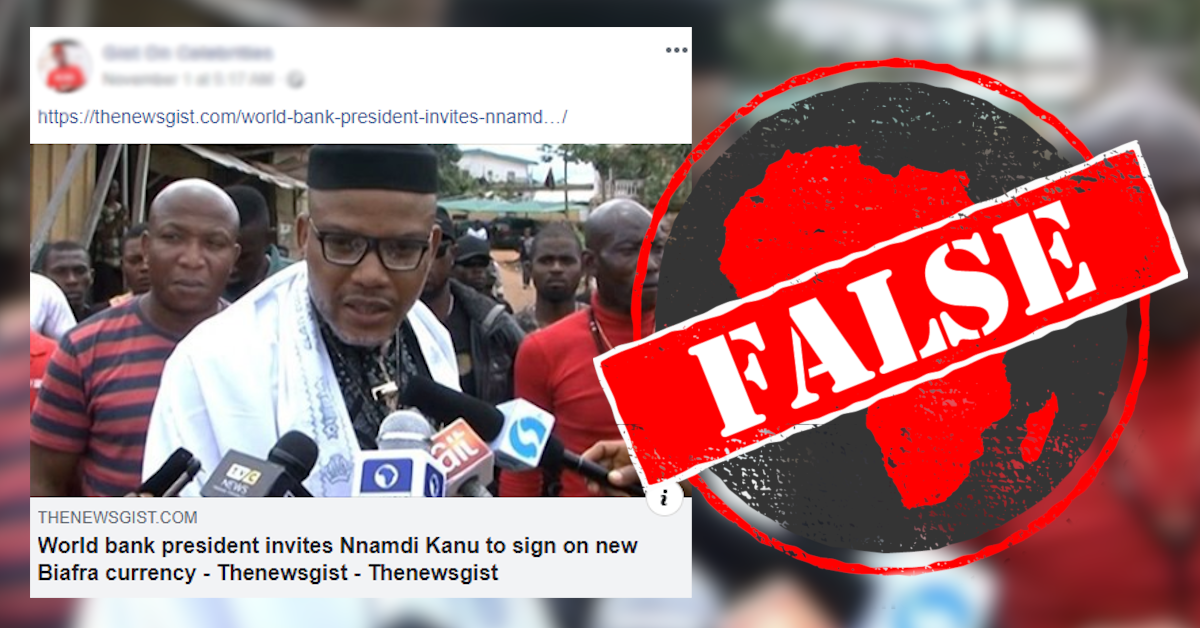An article on the website Jamyco claims the World Bank has invited Nnamdi Kanu, leader of the Indigenous People of Biafra, to put his name on a new currency for Biafra.
Published on 31 October 2019, the article was shared on other news sites and on Facebook.
“Chima Nwagu, the founder and Chief Editor of Biafra daily news watch, has confirmed that the world bank president, David Robert Malpass invites the leader of Biafra movement worldwide, Mazi Nnamdi Kanu to come and sign on new Biafra currency,” it says.
Biafra is a region in south-eastern Nigeria. Its secession in 1967 sparked a civil war, and sympathisers’ calls for its independence continue.

The story has not been covered by any credible news organisations, in Nigeria or internationally. And the link to “Biafra daily news watch” only returns an error page on Jamyco.
Africa Check asked the World Bank about the claim.
“The information citing the World Bank’s President inviting the leader of Biafra, Nnamdi Kanu, to sign a new Biafra currency is untrue,” a bank spokesperson told us in an email.
“The World Bank Group provides financing, policy advice, and technical assistance to governments of developing countries… In Nigeria, we work directly with the Government.”
Africa Check has previously debunked a number of false claims Jamyco has published about Biafra. – Jennifer Ojugbeli
Published on 31 October 2019, the article was shared on other news sites and on Facebook.
“Chima Nwagu, the founder and Chief Editor of Biafra daily news watch, has confirmed that the world bank president, David Robert Malpass invites the leader of Biafra movement worldwide, Mazi Nnamdi Kanu to come and sign on new Biafra currency,” it says.
Biafra is a region in south-eastern Nigeria. Its secession in 1967 sparked a civil war, and sympathisers’ calls for its independence continue.

‘The information is untrue’
The story has not been covered by any credible news organisations, in Nigeria or internationally. And the link to “Biafra daily news watch” only returns an error page on Jamyco.
Africa Check asked the World Bank about the claim.
“The information citing the World Bank’s President inviting the leader of Biafra, Nnamdi Kanu, to sign a new Biafra currency is untrue,” a bank spokesperson told us in an email.
“The World Bank Group provides financing, policy advice, and technical assistance to governments of developing countries… In Nigeria, we work directly with the Government.”
Africa Check has previously debunked a number of false claims Jamyco has published about Biafra. – Jennifer Ojugbeli
Republish our content for free
For publishers: what to do if your post is rated false
A fact-checker has rated your Facebook or Instagram post as “false”, “altered”, “partly false” or “missing context”. This could have serious consequences. What do you do?
Click on our guide for the steps you should follow.
Publishers guideAfrica Check teams up with Facebook
Africa Check is a partner in Meta's third-party fact-checking programme to help stop the spread of false information on social media.
The content we rate as “false” will be downgraded on Facebook and Instagram. This means fewer people will see it.
You can also help identify false information on Facebook. This guide explains how.


Add new comment